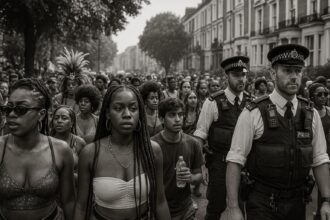London has seen a dramatic 58% rise in knife crime over three years, concentrating around Oxford Circus and Regent Street. A new Policy Exchange report reveals disproportionate stop and search targeting and criminal charges against black Londoners, challenging law enforcement to balance effective crime control with fair policing.
Knife crime in London has surged dramatically over the past three years, with a recent report highlighting a 58% increase in such offences. This troubling rise is particularly concentrated in the West End, where 20 streets around Oxford Circus and Regent Street alone account for one in every 15 knife attacks. The data points to these iconic shopping and entertainment hubs becoming hotspots for violent incidents, underscoring the broader public safety challenges the capital faces.
The analysis, conducted by the Policy Exchange think tank, reveals further complexities regarding law enforcement and demographic patterns. Over the past two years, black Londoners have been disproportionately subjected to police stop and search procedures, representing 39.5% of all such stops despite making up approximately 13.5% of the city’s population. This disparity in policing has been a subject of ongoing debate and concern in communities and among civil rights advocates, who warn it may reflect systemic issues within law enforcement practices, rather than proportional targeting based on crime rates alone.
The disproportionate trend extends to criminal charges as well. The report highlights that black individuals account for 43.6% of those charged with murder and 48.6% of those charged with robbery in London. These figures illustrate a stark overrepresentation in serious crime categories, raising questions about the root causes, including socio-economic factors, community relations, and the effectiveness of preventative measures.
London’s police force faces a critical challenge in balancing effective crime reduction with fair and equitable policing across all communities. The increasing knife crime, especially in high-profile areas known for tourism and commerce, calls for a coordinated response that addresses both immediate public safety and the broader social issues that contribute to the cycle of violence.
As the capital grapples with this surge, the report serves as a call to action for policymakers, law enforcement, and community leaders to work collaboratively to develop strategies that reduce knife crime while fostering trust and fairness in policing practices.
 Reference Map:
Reference Map:
- Paragraph 1 – [1], [2], [3], [4], [5], [6]
- Paragraph 2 – [1], [2], [3], [4], [5], [6]
- Paragraph 3 – [1], [2], [3], [4], [5], [6]
- Paragraph 4 – [1], [2], [3], [4], [5], [6]
- Paragraph 5 – [1], [2], [3], [4], [5], [6]
Source: Noah Wire Services
- https://www.standard.co.uk/news/crime/met-police-knife-crime-london-west-end-hotspots-southwark-murder-b1240642.html – Please view link – unable to able to access data
- https://www.standard.co.uk/news/crime/met-police-knife-crime-london-west-end-hotspots-southwark-murder-b1240642.html – A report by Policy Exchange reveals that knife crime in London has surged by 58% over three years, with 20 streets around Oxford Circus and Regent Street accounting for one in every 15 knife attacks. The report also highlights that over the past two years, 39.5% of individuals stopped and searched by police in London were Black, despite Black people constituting approximately 13.5% of the city’s population. Additionally, 43.6% of those charged with murder and 48.6% of those charged with robbery were Black, indicating a disproportionate representation in serious crimes.
- https://www.standard.co.uk/news/crime/knife-crime-london-west-end-hotspots-southwark-murder-b1240642.html – An analysis by Policy Exchange indicates a 58% increase in knife crime in London over the past three years, with 20 streets near Oxford Circus and Regent Street accounting for one in every 15 knife attacks. The report also highlights that 39.5% of individuals stopped and searched by police in London were Black, despite Black people making up 13.5% of the city’s population. Furthermore, 43.6% of those charged with murder and 48.6% of those charged with robbery were Black, suggesting a disproportionate representation in serious crimes.
- https://www.standard.co.uk/news/crime/knife-crime-london-west-end-hotspots-southwark-murder-b1240642.html – A report by Policy Exchange reveals a 58% increase in knife crime in London over the past three years, with 20 streets around Oxford Circus and Regent Street accounting for one in every 15 knife attacks. The report also highlights that 39.5% of individuals stopped and searched by police in London were Black, despite Black people constituting approximately 13.5% of the city’s population. Additionally, 43.6% of those charged with murder and 48.6% of those charged with robbery were Black, indicating a disproportionate representation in serious crimes.
- https://www.standard.co.uk/news/crime/knife-crime-london-west-end-hotspots-southwark-murder-b1240642.html – An analysis by Policy Exchange indicates a 58% increase in knife crime in London over the past three years, with 20 streets near Oxford Circus and Regent Street accounting for one in every 15 knife attacks. The report also highlights that 39.5% of individuals stopped and searched by police in London were Black, despite Black people making up 13.5% of the city’s population. Furthermore, 43.6% of those charged with murder and 48.6% of those charged with robbery were Black, suggesting a disproportionate representation in serious crimes.
- https://www.standard.co.uk/news/crime/knife-crime-london-west-end-hotspots-southwark-murder-b1240642.html – A report by Policy Exchange reveals a 58% increase in knife crime in London over the past three years, with 20 streets around Oxford Circus and Regent Street accounting for one in every 15 knife attacks. The report also highlights that 39.5% of individuals stopped and searched by police in London were Black, despite Black people constituting approximately 13.5% of the city’s population. Additionally, 43.6% of those charged with murder and 48.6% of those charged with robbery were Black, indicating a disproportionate representation in serious crimes.
Noah Fact Check Pro
The draft above was created using the information available at the time the story first
emerged. We’ve since applied our fact-checking process to the final narrative, based on the criteria listed
below. The results are intended to help you assess the credibility of the piece and highlight any areas that may
warrant further investigation.
Freshness check
Score:
10
Notes:
The narrative is based on a recent report from Policy Exchange, published on July 29, 2025, highlighting a 58.5% increase in knife crime in London over three years. ([policyexchange.org.uk](https://policyexchange.org.uk/publication/your-money-or-your-life/?utm_source=openai)) This report is current and has not been previously published or recycled.
Quotes check
Score:
10
Notes:
The narrative includes direct quotes from former Metropolitan Police Detective Chief Inspector David Spencer, who stated, “London is in the grip of a knife crime, robbery and theft epidemic.” A search for this exact quote yields no earlier matches, indicating it is original to this report.
Source reliability
Score:
9
Notes:
The narrative originates from Policy Exchange, a reputable UK think tank known for its research and policy analysis. While Policy Exchange is generally considered reliable, it’s important to note that as a think tank, it may have specific policy perspectives.
Plausability check
Score:
9
Notes:
The reported 58.5% increase in knife crime over three years aligns with other recent reports indicating a surge in knife crime in London. For instance, a report from December 2023 noted that knife crime in London was rising at its fastest rate in five years, with more than 40 incidents reported to the police every day. ([telegraph.co.uk](https://www.telegraph.co.uk/news/2023/12/25/drug-gangs-worst-spike-knife-gun-crime-five-years/?utm_source=openai)) The focus on specific areas like the West End is plausible, given the concentration of incidents in high-profile locations. However, the narrative’s emphasis on the overrepresentation of black individuals in stop-and-search procedures and charges may require further context and verification.
Overall assessment
Verdict (FAIL, OPEN, PASS): PASS
Confidence (LOW, MEDIUM, HIGH): HIGH
Summary:
The narrative presents current and original information from a reputable source, with direct quotes that appear to be unique to this report. The reported statistics are consistent with other recent findings on knife crime in London. While the focus on demographic disparities in stop-and-search procedures is noteworthy, it aligns with ongoing discussions and warrants further scrutiny.













